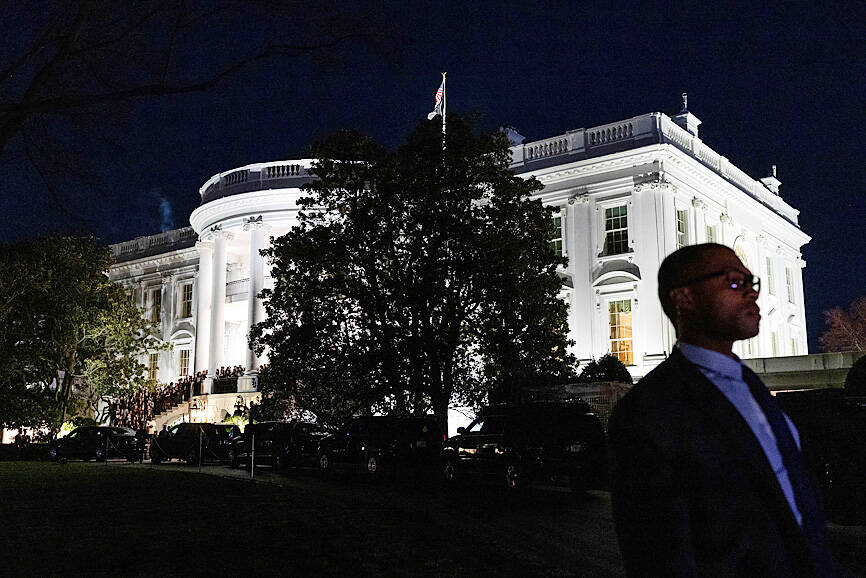The White House’s 2025 fiscal budget proposal, released on Monday, includes a US$100 million request to assist Taiwan in enhancing deterrence capabilities, and maintaining peace and stability in the Taiwan Strait.
The funding would help the US Department of State and the US Agency for International Development bolster and expand Taiwan’s collaboration with international partners, the department said in a statement.
It described the US$100 million request as a “historic investment in Taiwan’s security” through the Foreign Military Financing (FMF) mechanism “to strengthen deterrence and maintain peace and stability across the Taiwan Strait.”

Photo: Reuters
The request comes after US President Joe Biden signed off on a US$80 million grant through the FMF in November last year to bolster Taiwan’s military capabilities.
US Deputy Secretary of State for Management and Resources Richard Verma said it was “historic” because it would create a dedicated funding item for Taiwan.
“We break out Taiwan for the first time and have a specific line item for it. It reaffirms our commitment to security assistance for Taiwan, and to a free and open Indo-Pacific. I think it’s very clear. I think it stands on its own,” Verma said.
Regarding whether the funding would provide for a permanent training mission for US special forces in Taiwan, Verma said he did not think so, adding that it was just “traditional security assistance.”
“There’s also IMET [International Military Education and Training] assistance, and again, you have to read that together with the totality of our assistance in the Indo-Pacific Strategy and the new mandatory funding we’ve also added,” he said.
IMET is intended to establish rapport between the US military and those of other nations to build alliances.
In a separate budget overview released by the US Department of Defense, its proposal includes a US$500 million request to replenish US weapons stocks in Taiwan using the Presidential Drawdown Authority.
The “first-time funding request” would “address aggression in the region and ensure continued support to our allies,” while enabling the Pentagon to replace its inventory of “munitions and equipment and maintain readiness,” the defense department said.
Additional reporting by Bloomberg

ENDEAVOR MANTA: The ship is programmed to automatically return to its designated home port and would self-destruct if seized by another party The Endeavor Manta, Taiwan’s first military-specification uncrewed surface vehicle (USV) tailor-made to operate in the Taiwan Strait in a bid to bolster the nation’s asymmetric combat capabilities made its first appearance at Kaohsiung’s Singda Harbor yesterday. Taking inspiration from Ukraine’s navy, which is using USVs to force Russia’s Black Sea fleet to take shelter within its own ports, CSBC Taiwan (台灣國際造船) established a research and development unit on USVs last year, CSBC chairman Huang Cheng-hung (黃正弘) said. With the exception of the satellite guidance system and the outboard motors — which were purchased from foreign companies that were not affiliated with Chinese-funded

PERMIT REVOKED: The influencer at a news conference said the National Immigration Agency was infringing on human rights and persecuting Chinese spouses Chinese influencer “Yaya in Taiwan” (亞亞在台灣) yesterday evening voluntarily left Taiwan, despite saying yesterday morning that she had “no intention” of leaving after her residence permit was revoked over her comments on Taiwan being “unified” with China by military force. The Ministry of the Interior yesterday had said that it could forcibly deport the influencer at midnight, but was considering taking a more flexible approach and beginning procedures this morning. The influencer, whose given name is Liu Zhenya (劉振亞), departed on a 8:45pm flight from Taipei International Airport (Songshan airport) to Fuzhou, China. Liu held a news conference at the airport at 7pm,

GRIDLOCK: The National Fire Agency’s Special Search and Rescue team is on standby to travel to the countries to help out with the rescue effort A powerful earthquake rocked Myanmar and neighboring Thailand yesterday, killing at least three people in Bangkok and burying dozens when a high-rise building under construction collapsed. Footage shared on social media from Myanmar’s second-largest city showed widespread destruction, raising fears that many were trapped under the rubble or killed. The magnitude 7.7 earthquake, with an epicenter near Mandalay in Myanmar, struck at midday and was followed by a strong magnitude 6.4 aftershock. The extent of death, injury and destruction — especially in Myanmar, which is embroiled in a civil war and where information is tightly controlled at the best of times —

Taiwan was ranked the fourth-safest country in the world with a score of 82.9, trailing only Andorra, the United Arab Emirates and Qatar in Numbeo’s Safety Index by Country report. Taiwan’s score improved by 0.1 points compared with last year’s mid-year report, which had Taiwan fourth with a score of 82.8. However, both scores were lower than in last year’s first review, when Taiwan scored 83.3, and are a long way from when Taiwan was named the second-safest country in the world in 2021, scoring 84.8. Taiwan ranked higher than Singapore in ninth with a score of 77.4 and Japan in 10th with